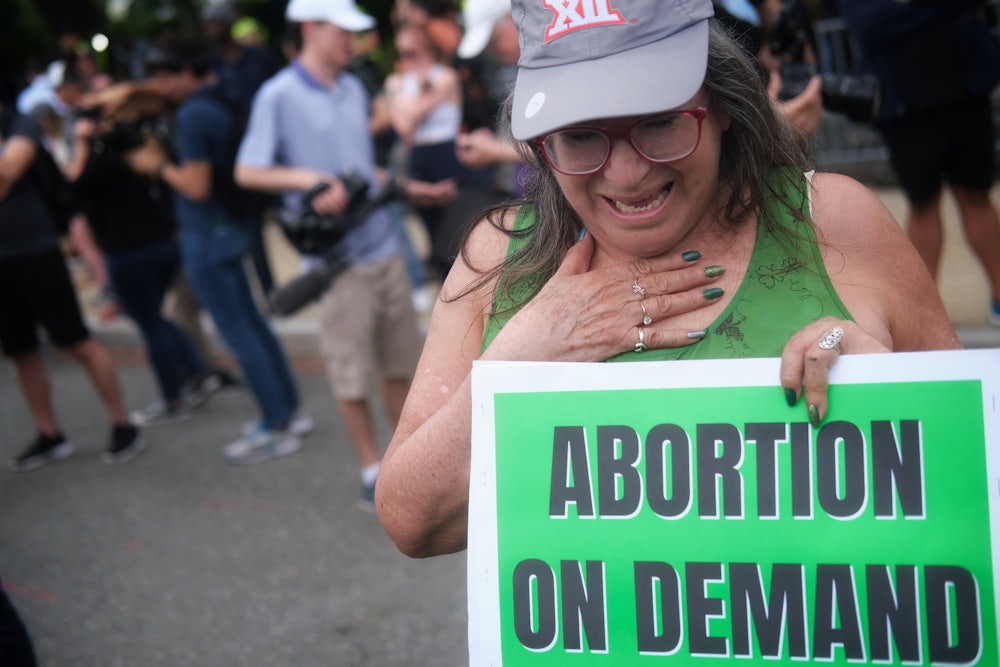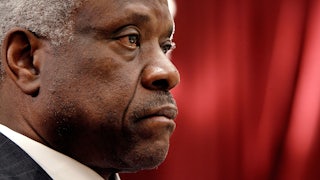I’ve never lived without Roe, and while I can’t precisely remember the first time someone working in abortion rights told me to expect that we would lose them soon, I know that it was more than 10 years ago. I also know that it takes time to adjust to the unsettling of established rights, of established law—decades of which were demolished in a few brief lines of Justice Samuel Alito’s 79-page majority opinion, issued Friday morning, in Dobbs v. Jackson Women’s Health Organization: “The Constitution does not confer a right to abortion; Roe and Casey are overruled; and the authority to regulate abortion is returned to the people and their elected representatives.” The people who show up later this week to help others get to a clinic, and those who scramble to support women who have had their abortion appointments canceled, have had time to plan for this moment. What many other people in the United States are about to go through is a kind of national catching-up. It will take time.
Yet before anyone had the chance to read the full opinion came a cast of former prosecutors who now work as professional legal commentators, who (fairly) called this, among other things, “a very dark day in America.” They are trying to describe how unprecedented this opinion is, while they are reaching for the familiar—to soothe ahead of the pain. They are asking if the era of looking to the court to protect our rights, with Dobbs, has ended. It’s not just the overturning of Roe, I believe, that unsettles. The whole idea of a rule of law that defines and protects rights is, correctly, feeling just as unstable. It’s just that this is not at all a new condition.
This did not start today, the power of the courts themselves to jeopardize liberty and obstruct justice. Many people in the United States have already been living outside the era of legally constituted “rights,” whether that’s due to the courts rolling back abortion rights or the right to vote. Far from breaking with precedent, the decision in Dobbs has only brought that condition nearer to more people’s lives.
Some will look for a solution to this erosion of rights within the same legal system that eroded them. That is understandable. To expand the court, to impose term limits, to abolish the Electoral College so that we never again end up with a majority of justices appointed by presidents who lost the popular vote—those are solutions, even if they depart from some norms, that still feel somewhat familiar and orderly. They involve clear steps that members of Congress could or could not take, campaign promises made or ignored, calm cable news discussions thereof (in the breaks between the January 6 hearings on attempts to undermine the Justice Department or news of patriot groups whose members have links to former Republican legislators menacing Pride events for kids).
That exaggerated and mostly unmerited hope for what the law can do is why we now have this decision. Locating the demand for abortion access in the courts, for example, made it a fight waged mostly by lawyers, which in turn pushed the movement—including providers and people who have abortions—to the margins. Resources that could have gone to expanding access went to crafting legal arguments that could, at best, slow the onslaught of abortion restrictions instituted by the Christian right. Clinic escorting, community abortion funds, informal networks ensuring access through travel and housing—that’s where abortion rights have been fought for by and on behalf of so many more people, and where abortion access will be defended now.
There will still be a legal battle for abortion, one that now moves from the defense of constitutional rights to criminal defense—to challenge the criminalization of both providers and people who have abortions. People have been criminalized for the outcomes of their pregnancies, even with Roe: National Advocates for Pregnant Women, or NAPW, has identified at least 1,600 such cases since 1973 involving arrests or other deprivations of liberty, according to executive director Lynn Paltrow. That can include people criminalized for self-managed abortion, a method that will become more commonplace. Farah Diaz-Tello, senior counsel and legal director at the reproductive justice law and policy organization If/When/How, told me that at least 60 people have faced criminal penalties for self-managed abortions between 2000 and the present day, according to the preliminary findings of its research—which she cautioned is very likely an undercount. Groups like If/When/How and NAPW are growing networks of criminal defense attorneys with the expertise to take on these cases, as well as educating health care providers and child welfare workers on how to resist pregnancy criminalization.
Navigating the post-Roe world, though, will require going outside the law. As Laurie Bertram Roberts—executive director of the Yellowhammer Fund, an abortion fund based in Alabama, and co-founder of the Mississippi Reproductive Freedom Fund—put it when we spoke in the spring, “You have to be able to move in areas that may make people uncomfortable, that may not be fully ‘legal,’ while you are striving for what should be legal.” For all who have spent decades demanding that courts respect the constitutional right to an abortion—the rule of law itself—will they now do something they have argued against? Will they be willing to violate the law?






